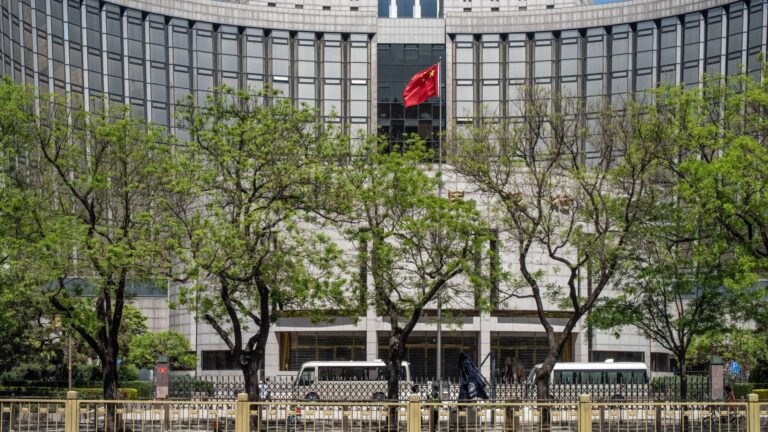Shares of Chinese chipmakers rise after China bars some purchases on Micron products
Shares of Chinese chipmakers largely rose after China’s Cyberspace Administration said it would bar operators of key infrastructure from buying products from U.S. memory producer Micron.
Hong Kong-listed Hua Hong Semiconductor rose as much as 3.14% on Monday, while SMIC rose 2.64%.
Other memory chip producers in mainland China like GigaDevice Semiconductor and Ingenic semiconductor also saw gains of up to 3.74% and 8.08% respectively.
China’s Cyberspace administration explained that Micron products have failed its network security review, citing “serious potential network security issues.”
The cyberspace administration did not specify which products will be prohibited or what security issues Micron’s products had in its release.
— Lim Hui Jie
China bars Micron product purchases after its security review
China’s Cyberspace Administration has barred operators of “critical information infrastructure” in China from purchasing products from U.S. memory producer Micron.
This comes as the Cyberspace Administration of China said that Micron products have failed its network security review, citing “serious potential network security issues.”
It added that this “poses a major security risk to China’s critical information infrastructure supply chain and affects [its] national security.”
The cyberspace administration did not specify which products will be prohibited or what security issues Micron’s products had in its release.
Shares of Micron’s rivals in South Korea rose Monday morning after the announcement, with SK Hynix rising 1.54% and Samsung Electronics gaining 0.5%.
— Lim Hui Jie
China leaves 1-year, 5-year lending rates unchanged
The People’s Bank of China left its benchmark lending rates unchanged for the ninth consecutive month.
China left its 1-year loan prime rate unchanged at 3.65% and its 5-year loan prime rate unchanged at 4.30%, in line with expectations by economists polled by Reuters.
The Chinese onshore yuan weakened 0.2% to 7.0205 against the U.S. dollar.
— Jihye Lee
South Korean exports fall 16.1% year-on-year in May 1-20 period
Exports from South Korea have fallen 16.1% in the first 20 days of May compared to the same period a year ago, its customs agency said.
Imports in the same period also fell 15.3% year-on-year.
Exports value for the first 20 days came in $32.4 billion and imports stood at $36.7 billion, resulting in a $4.3 billion deficit for the May 1-20 period
Refinitiv data showed that South Korea’s exports have declined for seven straight months, with April recording a 14.3% fall year-on-year.
— Lim Hui Jie
Japan’s core machinery orders fell in March
Japan’s core machinery orders fell 3.9% in March compared to the previous month, falling further than expected.
Economists polled by Reuters had expected the reading to rise by 0.7% month-on-month.
Compared to a year ago, machinery orders also fell 3.5%, against expectations for the print to rise by 1.4%
Japan’s machinery orders rose 9.8% year-on-year in February.
— Jihye Lee
CNBC Pro: Tesla vs. BYD: Here’s why one fund manager prefers the Buffett-backed automaker
In an era defined by the need to tackle climate change, electric vehicles (EVs) are seen as an increasingly important part of the solution.
For Philip Ripman, portfolio manager at Storebrand Asset Management, one global EV automaker stands out: China’s BYD — not Elon Musk’s Tesla.
As an investor, Ripman said that BYD’s appeal goes beyond just manufacturing electric cars.
CNBC Pro subscribers can read why the fund manager is bullish on BYD here.
— Ganesh Rao
CNBC Pro: These 4 stocks are on Goldman’s ‘conviction buy’ list — and it gives one 115% upside
Debt celing negotiations to resume on Monday
Federal leaders are expected to continue with negotiations on the U.S. debt ceiling on Monday as the country approaches a potential default.
President Joe Biden and House Speaker Kevin McCarthy, R-Calif., are scheduled to meet in person at the White House.
Treasury Secretary Janet Yellen said Sunday that “hard choices” will need to be made about which bills will go unpaid if the debt ceiling is not raised and reaffirmed her warning that the United States could default on its debt as early as June 1,
— Jesse Pound, Ashley Capoot
Powell says rates may not have to rise as much as expected
Federal Reserve Chair Jerome Powell said Friday that interest rates may not have to rise as much as previously thought in part due to stresses seen in the banking sector.
“The financial stability tools helped to calm conditions in the banking sector. Developments there, on the other hand, are contributing to tighter credit conditions and are likely to weigh on economic growth, hiring and inflation,” he said as part of a panel on monetary policy.
“So as a result, our policy rate may not need to rise as much as it would have otherwise to achieve our goals,” he added. “Of course, the extent of that is highly uncertain.”
— Jeff Cox
Fed’s Williams says ‘era of very low’ interest rates remains intact
New York Federal Reserve President John Williams said the longer-term trend in interest rates is likely lower, despite the recent increases in an attempt to battle inflation.
In a largely academic discussion during a forum in Washington, D.C., Williams said the “natural” rate of interest remains to the downside as the prospects for economic output are muted. That’s despite the pandemic-era surge in inflation and the increases in the interest rates to combat the higher prices.
“Importantly, there is no evidence that the era of very low natural rates of interest has ended,” Williams said.
—Jeff Cox



